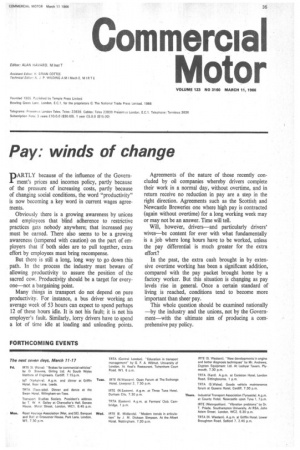Pay: winds of change
Page 37

If you've noticed an error in this article please click here to report it so we can fix it.
DARTLY because of the influence of the Govern
ment's prices and incomes policy, partly because of the pressure of increasing costs, partly because of changing social conditions, the word "productivity" is now becoming a key word in current wages agreements.
Obviously there is a growing awareness by unions and employees that blind adherence to restrictive practices gets nobody anywhere; that increased pay must be earned. There also seems to be a growing awareness (tempered with caution) on the part of employers that if both sides are to pull together, extra effort by employees must bring recompense.
But there is still a long, long way to go down this path. In the process the industry must beware of allowing productivity to assure the position of the sacred cow. Productivity should be a target for everyone—not a bargaining point.
Many things in transport do not depend on pure productivity. For instance, a bus driver working an average week of 53 hours can expect to spend perhaps 12 of these hours idle. It is not his fault; it is not his employer's fault. Similarly, lorry drivers have to spend a lot of time idle at loading and unloading points. Agreements of the nature of those recently concluded by oil companies whereby drivers complete their work in a normal day, without overtime, and in return receive no reduction in pay are a step in the right direction. Agreements such as the Scottish and Newcastle Breweries one where high pay is contracted (again without overtime) for a long working week may or may not be an answer. Time will tell.
Will, however, drivers—and particularly drivers' wives—be content for ever with what fundamentally is a job where long hours have to be worked, unless the pay differential is much greater for the extra effort?
In the past, the extra cash brought in by extensive overtime working has been a significant addition, compared with the pay packet brought home by a factory worker. But this situation is changing as pay levels rise in general. Once a certain standard of living is reached, conditions tend to become more important than sheer pay.
This whole question should be examined nationally —by the industry and the unions, not by the Government—with the ultimate aim of producing a comprehensive pay policy.








































































































































